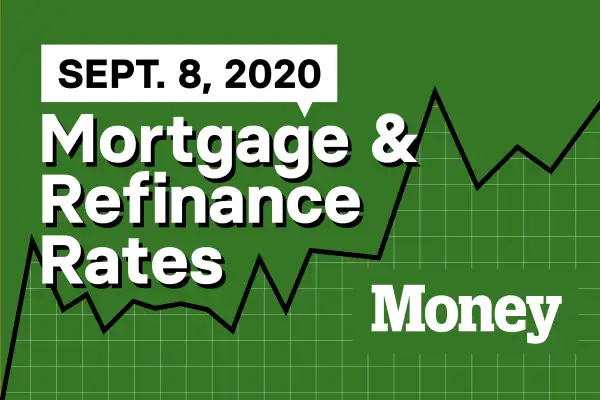Here Are Today's Best Mortgage & Refinance Rates for September 8, 2020

Borrowers with 700 credit scores were quoted an average rate of 3.439% to secure a 30-year fixed-rate purchase mortgage on Friday, according to Money's survey of over 8,000 lenders across the United States. At this credit score, roughly the national average, the average rate for a 30-year refinance was 4.399%. Our rates include discount points and are for borrowers putting 20% down.
Borrowers in Washington, D.C. were quoted the lowest mortgage rates on Friday—at 3.272%. Those in Georgia saw the highest average rate at 3.706%. Nationwide, borrowers with the highest credit scores, 740 and above, were quoted rates averaging 3.097%, while those with credit of 640 or below were given rates of 4.897%—a 1.8 percentage point spread.
You may be able to negotiate a lower rate if you shop around or if you have other accounts with the lender. Currently, some banks are hiking up advertised rates to keep demand in check, so you may be offered a lower rate if you reach out directly.
Freddie Mac's widely quoted Primary Mortgage Market Survey put rates at 2.93% with 0.8 points paid for the week ending September 3. The mortgage purchaser's weekly survey reflects borrowers who put 20% down on conforming loans and have excellent credit.
Refinance rates today
Money's survey shows that the offered rate for a 30 year refinance for someone with a 740 credit score was 3.585% on Friday. Last September, the average mortgage rate (including fees) was 3.922%.
A homeowner with a $200,000 mortgage balance currently paying 3.922% on a 30-year loan could potentially cut their monthly payment from $946 to $908 by financing at today's lower rates. To determine if it's worth it to refinance your mortgage, also consider the closing fees you paid on your current mortgage, how much your new lender is charging and how long you have left on your loan term. (Our picks for the best lenders for refinancing are here).
What else is happening in the housing market right now?
The news of today, that could impact your home tomorrow
The share of mortgages that are in some stage of delinquency reached 7.1% in June 2020, according to CoreLogic's Loan Performance Insights Report. The share of loans at least 30 days past due rose 3.1-percentage points from June 2019, when the overall delinquency rate was 4%.
The increase was lead by "seriously delinquent" loans, leading to concerns of foreclosures on the horizon/ The share of mortgages that are 90 days or more past due—considered "seriously delinquent"—reached the highest level since 2015. Hitting 3.4% in June, up from 1.3% in June 2019.
In June 1.8% of mortgage loans were 60 to 89 days past due, up from 0.8% last year. On the bright side, loans that were 30 days past due had a year-over-year decrease from 2.1% to 1.8%, and a slightly smaller share of loans transitioned from current to past due. The foreclosure rate also ticked down to 0.3% from 0.4%.
While home prices and housing demand has soared during the pandemic as buyers with means take advantage of historically low mortgage rates, the performance of mortgage loans has weakened during the same period as a result of high unemployment and economic uncertainty. CoreLogic is forecasting that serious delinquencies could double by early 2022 if no additional government support is provided. The saving grace for homeowners in distress up til now has been the forbearance programs set up by the CARES act.
"Forbearance has been an important tool to help many homeowners through financial stress due to the pandemic," said Frank Martell, CEO of CoreLogic. "While federal and state governments work toward additional economic support, we expect serious delinquencies will continue to rise - particularly among lower-income households, small business owners, and employees within sectors like tourism that have been hard hit by the pandemic."
Mortgage Prediction of the Week
Expert views on what comes next.
Archana Pradham, principal economist at CoreLogic, a real estate data analytics provider, on how long the housing inventory will last:
Given the continued economic uncertainty and lack of activity among existing homeowners (repeat buyers), we anticipate the inventory shortage to persist through the rest of the year, with inventory levels remaining at 20% to 30% below last year's levels."
Bottom line:
The Overlooked Reason It's So Hard to Buy a Home in 2020
When Will It Get Easier to Buy a Home? 8 Experts on the Nation's Housing Shortage
